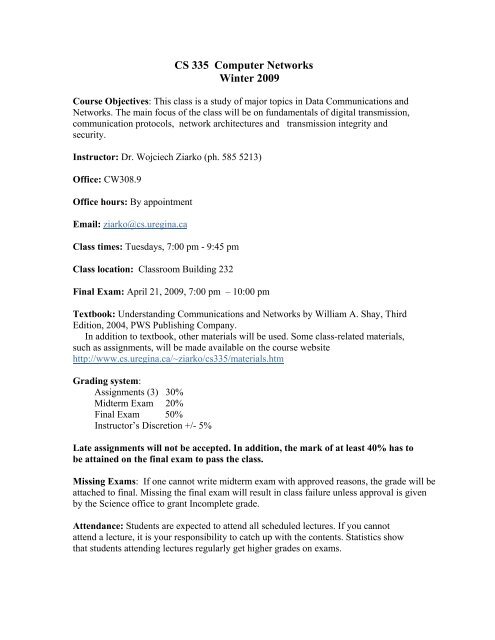Course Outline - the Department of Computer Science
Course Outline - the Department of Computer Science
Course Outline - the Department of Computer Science
You also want an ePaper? Increase the reach of your titles
YUMPU automatically turns print PDFs into web optimized ePapers that Google loves.
CS 335 <strong>Computer</strong> Networks<br />
Winter 2009<br />
<strong>Course</strong> Objectives: This class is a study <strong>of</strong> major topics in Data Communications and<br />
Networks. The main focus <strong>of</strong> <strong>the</strong> class will be on fundamentals <strong>of</strong> digital transmission,<br />
communication protocols, network architectures and transmission integrity and<br />
security.<br />
Instructor: Dr. Wojciech Ziarko (ph. 585 5213)<br />
Office: CW308.9<br />
Office hours: By appointment<br />
Email: ziarko@cs.uregina.ca<br />
Class times: Tuesdays, 7:00 pm - 9:45 pm<br />
Class location: Classroom Building 232<br />
Final Exam: April 21, 2009, 7:00 pm – 10:00 pm<br />
Textbook: Understanding Communications and Networks by William A. Shay, Third<br />
Edition, 2004, PWS Publishing Company.<br />
In addition to textbook, o<strong>the</strong>r materials will be used. Some class-related materials,<br />
such as assignments, will be made available on <strong>the</strong> course website<br />
http://www.cs.uregina.ca/~ziarko/cs335/materials.htm<br />
Grading system:<br />
Assignments (3) 30%<br />
Midterm Exam 20%<br />
Final Exam 50%<br />
Instructor’s Discretion +/- 5%<br />
Late assignments will not be accepted. In addition, <strong>the</strong> mark <strong>of</strong> at least 40% has to<br />
be attained on <strong>the</strong> final exam to pass <strong>the</strong> class.<br />
Missing Exams: If one cannot write midterm exam with approved reasons, <strong>the</strong> grade will be<br />
attached to final. Missing <strong>the</strong> final exam will result in class failure unless approval is given<br />
by <strong>the</strong> <strong>Science</strong> <strong>of</strong>fice to grant Incomplete grade.<br />
Attendance: Students are expected to attend all scheduled lectures. If you cannot<br />
attend a lecture, it is your responsibility to catch up with <strong>the</strong> contents. Statistics show<br />
that students attending lectures regularly get higher grades on exams.
Introduction to Communications:<br />
CS 335 COURSE OUTLINE<br />
• History<br />
• Types <strong>of</strong> Communications<br />
• <strong>Computer</strong> Networks Topologies<br />
• Communications Protocols<br />
• Structure <strong>of</strong> <strong>Computer</strong> Communications Network<br />
• Future <strong>of</strong> Communications<br />
Transmissions Fundamentals<br />
• Analog v.s. Digital Signals<br />
• Transmission Media<br />
• Communications Services<br />
• Information Coding<br />
• Signal Sampling<br />
• Modulation and Demodulation<br />
• Analog to Digital Conversion<br />
• Modems<br />
Data Communications<br />
• Transmissions Modes<br />
• Interface Standards<br />
• Multiplexing<br />
• Contention Protocols<br />
• Collisions<br />
• Token Ring Networks<br />
• Data Compression<br />
Data Security<br />
• Transmissions Error Detection Techniques<br />
• Data Encryption and Decryption<br />
• Public Key Encryption<br />
• Viruses<br />
Wide Area Networks (WAN’s)<br />
• Network Routing<br />
• Internet Protocol TCP/IP<br />
Applications<br />
• Client-Server Computing<br />
• Virtual Terminal<br />
• Telnet<br />
• FTP<br />
• Electronic Mail<br />
• World Wide Web



![Exercise 1 : B-Trees [1+1+4+3+8=17pts]](https://img.yumpu.com/51300836/1/190x245/exercise-1-b-trees-1-1-4-3-817pts.jpg?quality=85)




